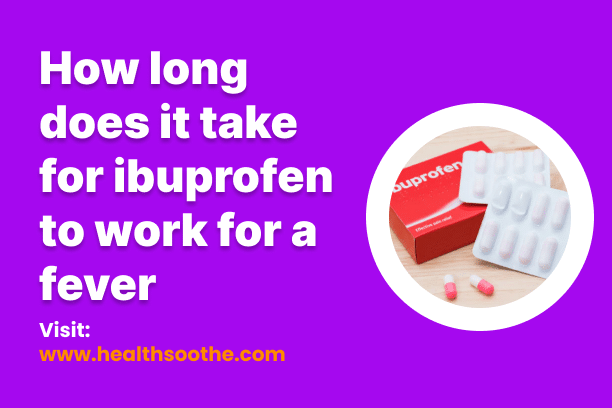The onset of ibuprofen’s effectiveness can vary among individuals, influenced by factors such as the purpose for its use, the prescribed dosage, concurrent medications, and individual characteristics like age and overall health.
Ibuprofen, categorized as a nonsteroidal anti-inflammatory drug (NSAID), is commonly utilized to alleviate symptoms such as pain, inflammation, and fever.
Branded as Advil, Motrin, and Midol, among others, ibuprofen operates by suppressing an enzyme responsible for the production of prostaglandins, compounds associated with pain and inflammation in the body.
What’s ibuprofen used for?
Ibuprofen is frequently employed to alleviate pain, reduce fever, and address inflammation. It is commonly used for various conditions, including:
- Headache
- Muscle aches and pains
- Menstrual cramps
- Arthritis
- Backache
- Toothache
- Minor injuries
In cases of acute conditions, such as a headache, ibuprofen is typically taken only once or twice for a short-term relief.
However, for chronic conditions like back pain or arthritis, ibuprofen may necessitate regular intake over an extended period, spanning weeks or even months.
How long does it take to work?
Typically, it takes approximately 30 minutes for the effects of ibuprofen to become noticeable. Nevertheless, this duration can vary among individuals and for different reasons.
As ibuprofen takes effect, you usually experience a reduction in pain or fever, while its anti-inflammatory effects may take a longer period, often a week or more.
The peak levels of ibuprofen in your bloodstream are generally reached within 1 to 2 hours.
However, ibuprofen is rapidly eliminated from your body. This rapid clearance is one reason why, depending on the specific condition being treated, doses may need to be taken every few hours.
The timing of ibuprofen levels in children seems to be comparable. Younger children may metabolize and clear ibuprofen from their system more quickly than adults.
What can affect how long it takes to work?
The speed at which ibuprofen provides relief can vary among individuals, as several factors influence how quickly the drug takes effect.
Some factors that may impact the time it takes for ibuprofen to work include:
- The dosage administered
- Individual weight
- Age
- Overall health
- Whether there is food in the stomach
- Concurrent use of other medications
These variables contribute to the variability in the onset of symptom relief, with some people experiencing prompt relief, while others may find that it takes a longer duration for the effects to become apparent.
Read Also: Melatonin Round White Pill Uses, Side Effects.
Pros and Cons of Ibuprofen
Pros of Ibuprofen
- Effective Pain Relief
- Anti-Inflammatory Properties
- Fever Reduction
- Widely Available
Cons of Ibuprofen
- Gastrointestinal Side Effects
- Cardiovascular Risks
- Kidney Damage
Differences Between Ibuprofen and Amoxicillin
Ibuprofen
Commonly used for relieving pain (headaches, muscle aches), reducing inflammation (arthritis), and lowering fever.
Amoxicillin
Used to treat various bacterial infections, including respiratory tract infections, ear infections, urinary tract infections, and skin infections.
Alternative to Ibuprofen
Acetaminophen (Tylenol)
Acetaminophen is another over-the-counter pain reliever and fever reducer. It works differently than ibuprofen and doesn’t have the same anti-inflammatory properties. It’s often recommended for people who cannot tolerate NSAIDs or have certain medical conditions.
What’s the typical dosage?
Over-the-counter (OTC) ibuprofen is commonly found in 200-milligram (mg) pills, and it’s advisable to use the minimum effective dosage to alleviate symptoms. Typically, one ibuprofen pill is taken orally every 4 to 6 hours. If the initial pill doesn’t provide relief, a second pill can be taken.
It’s important not to exceed a total of 1,200 mg of ibuprofen in a single day, which translates to a maximum of 6 pills for OTC ibuprofen.
Furthermore, it is recommended to avoid taking ibuprofen for more than 10 consecutive days unless specifically directed by a doctor.
An upset stomach is a common side effect of ibuprofen and other NSAIDs. To mitigate this, taking ibuprofen with food or milk may be helpful.
For children, ibuprofen is available in liquid solution, chewable tablet, or pill form, and the recommended form depends on the child’s age. The dosage for children under age 12 is determined based on their body weight. If a child needs to take ibuprofen, it’s crucial to consult their pediatrician for the recommended dosage and frequency of administration.
Who should avoid taking ibuprofen?
Although ibuprofen is generally considered safe, it may not be suitable for everyone. It is advisable to refrain from taking ibuprofen if you:
- Have previously experienced an allergic reaction to ibuprofen, aspirin, or another type of NSAID.
- Currently have or have had a peptic ulcer in the past.
- Are about to undergo or have recently undergone a surgical procedure.
- Are pregnant.
Ibuprofen usage is associated with an increased risk of gastrointestinal bleeding, heart attack, and stroke. Additionally, it may interact with other medications you are taking. Therefore, it is crucial to consult your doctor before using ibuprofen if you:
- Are 60 years old or older.
- Frequently experience symptoms like heartburn, stomach pain, or stomach upset.
- Have a history of high blood pressure, heart disease, liver disease, kidney disease, or asthma.
- Have a bleeding disorder or are taking blood-thinning drugs.
- Use other types of medications, especially diuretics, steroids, or other NSAIDs.
If you are uncertain about the safety of ibuprofen for your specific situation, it is recommended to discuss it with your doctor or pharmacist.
What are the side effects?
Like many medications, ibuprofen can have side effects, particularly when taken at a higher dosage or over an extended period. The most common side effects include:
- Nausea
- Vomiting
- Diarrhea
- Indigestion
- Abdominal pain
Less common side effects encompass:
- Bloating
- Dizziness
- Tinnitus (ringing in the ears)
- Rash or hives
- Blurry vision
Taking an excessive amount of ibuprofen can pose dangers. Signs that you may have taken too much ibuprofen include:
- Black stool
- Vomit containing blood
- Shallow or difficult breathing
- Low blood pressure (hypotension)
- Rapid heartbeat
- Severe headache
- Urinary issues, such as bloody urine or minimal urination
- Convulsions
- Seizures
If any of the above symptoms occur, it is crucial to seek immediate medical attention. When seeking medical help, inform the healthcare professionals that you have been taking ibuprofen, and if possible, bring along the product packaging for reference.





